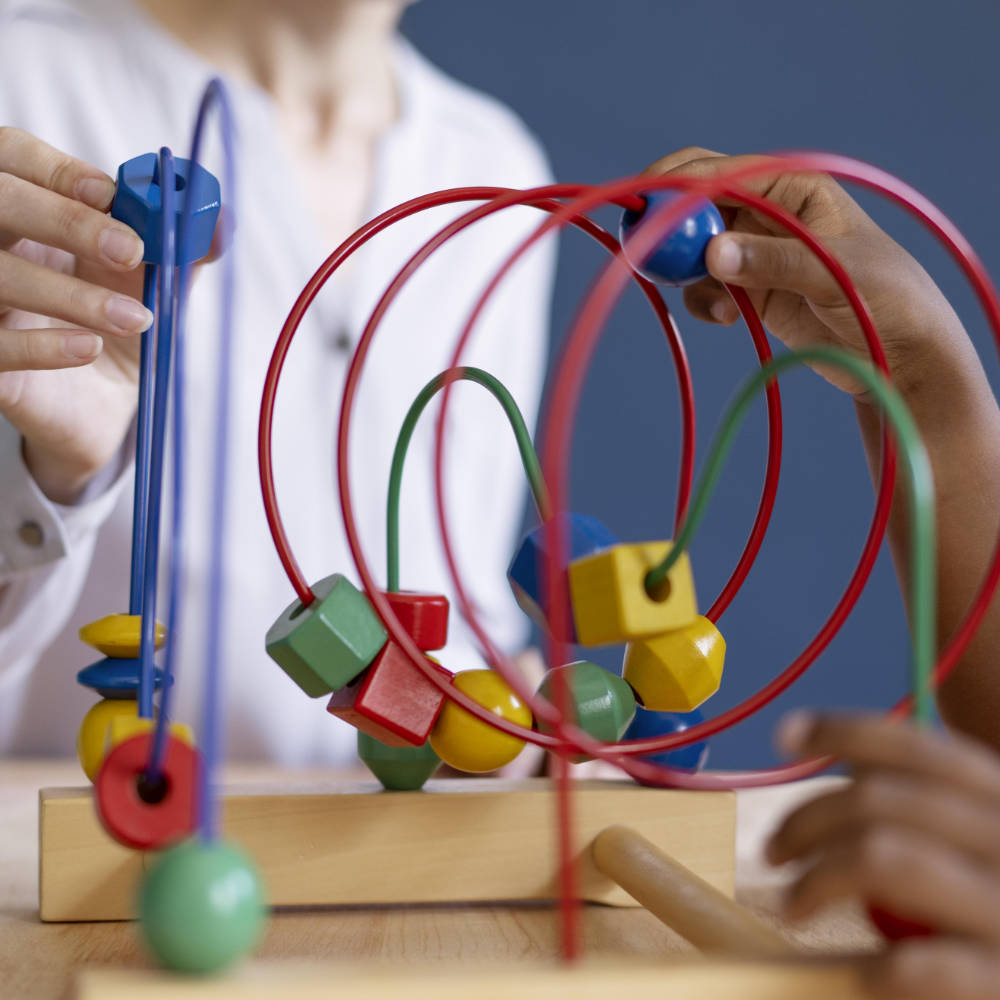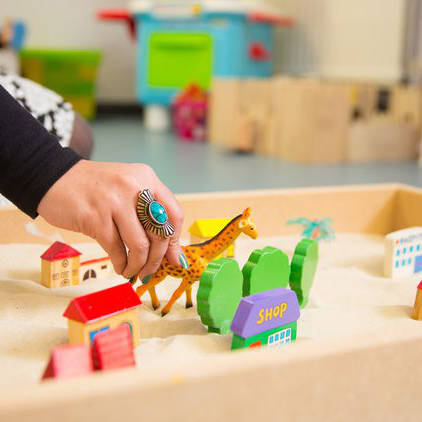Therapy

occupational therapy
Our Occupational Therapy is part of our integrated therapy team. Occupational Therapy interventions are integrated across the curriculum to ensure a consistent approach and the ongoing development of skills to maximise potential for learning and independence.
Our Occupational Therapist works with students during 1:1 sessions to improve their physical and self-care/life skills in preparation for adulthood. Occupational Therapists lead on a whole school approach to ensure the students’ sensory needs are met and integrated throughout the school day.
We have fully equipped Occupational Therapy rooms in which to carry out specialist interventions; these include gross and fine motor rooms and rooms dedicated to developing activities for daily living and independence.
Play Therapy
As part of our integrated therapy provision, Seva Education provides Play Therapy as bespoke packages to meet our students’ individual needs. Our Play Therapists are part of our talented team.
Our Play Therapists are trained to work with children and young people who are experiencing challenges, to help them understand what has been going on, how they feel, and what that means. We use a wide range of art and play materials to help our students process their feelings and thoughts without the need to talk or answer questions.
As part of the admissions/referral process, our therapists, who are part of the Multi-Disciplinary Team (MDT), are highly involved in the process to establish the type of therapy that may be required and the level of provision that will be implemented within a child’s therapy plan.
Before a child begins therapy, our therapist will talk to the parent(s)/carer, professionals involved and review relevant reports to obtain a greater understanding of the support required. They will also learn more about what has been happening and what everyone hopes to achieve by coming to the sessions. Next, the therapist will introduce themselves to the child/family and sessions will begin. Sessions are always held in the same place, at the same time each week, and for the same length of time.

What is Play Therapy?
Play Therapy is a specific type of therapy which incorporates play and art resources, as expressive tools to support individuals to express themselves in a playful and artistic way; especially when educational professionals find it difficult to understand how a student is feeling or when the student finds it difficult to put their experiences into words.
Seva Education recognises Play Therapy to be a unique and supportive approach for children and young people who may be in the need of therapeutic support, which will enable them to access the curriculum.
Our Aim
- Promoting social interactions and increasing our students’ communication skills through a holistic and unique social expressive environment
- Supporting our students to express themselves in a safe and communicative way which will enable them to understand their own interaction needs alongside clear development with their self-esteem and confidence, so that they are able to communicate and socially interact with others
- Assisting our students and teaching team to understand relevant needs such as autism and neurodiversity and specifically, what autism means to that student and why they are having difficulties expressing themselves confidently. Giving our children and young people the artistic and playful tools to express themselves regardless of their needs
- Increasing our students' ability to comprehend and self-regulate their emotions using the relevant play therapy interventions taught
- Training and developing staff to understand different therapeutic interventions to increase a child or young person's, expressive language skills by applying neurodiverse learning styles
Speech and language therapy
 The Seva Education Speech and Language Therapy (SaLT) Team are a talented and diverse team, which comprises qualified Speech and Language Therapists and Speech and Language Therapist Assistants. Our Speech and Language Therapists are extremely knowledgeable and experienced with supporting children and young people to cultivate a range of communication and interaction skills. These include social communication, emotional regulation, independence, receptive (understanding) language and expressive use of language. The Seva Education Speech and Language Team works closely with parents/carers, internal Seva Education teaching teams and external agencies involved, to ensure that the appropriate provision is offered, and students are making progress with their speech, communication and interaction.
The Seva Education Speech and Language Therapy (SaLT) Team are a talented and diverse team, which comprises qualified Speech and Language Therapists and Speech and Language Therapist Assistants. Our Speech and Language Therapists are extremely knowledgeable and experienced with supporting children and young people to cultivate a range of communication and interaction skills. These include social communication, emotional regulation, independence, receptive (understanding) language and expressive use of language. The Seva Education Speech and Language Team works closely with parents/carers, internal Seva Education teaching teams and external agencies involved, to ensure that the appropriate provision is offered, and students are making progress with their speech, communication and interaction.
The Seva Education’s SaLTs focus on the following areas through collaborative working with the relevant individuals who are crucial participants to your child’s development:
- Adapting to their environment and making their environment a safe and friendly area that enables them to communicate more effectively with the use of relevant resources
- Increasing positive relationships with peers and adults
- Identifying, understanding, and managing emotions
- Maintaining as healthy and well-balanced a life as possible
- Preparing for adulthood pathways i.e., employability and independence
- Understanding and managing emotions
- Accessing the community
We believe in implementing a functional approach. This enables children and young people to develop the crucial skills that will prepare them for adulthood and for living safe and independently in their own communities when they are adults without an EHCP.
Seva Education’s speech and language therapist can:
- Identify a child/young person’s strengths and needs
- Identify the child/young person's wants and needs at school/college in preparation for adulthood
- Identify the barriers that affect a child/young person’s ability to engage in the curriculum
- Identify interventions and provisions that can support the child/young person to increase their independent skills and communicate more effectively in school/college as well as the wider community
Stage 1: Referrals
When a referral is received additional information may be gathered.
Stage 2: Assessment/Observations
Assessment may include information gathering from parents, families and others involved in the child's life and building on what is already known about the child from other agencies such as education and social work.
Assessment will include:
- Understanding of spoken language and body language
- Expression through speaking and body language
- Production and use of sounds
- Ability to use language in a social context
- Play skills
- Eating, drinking and swallowing
This may include formal and informal assessment such as observation.
The decision whether to offer further support from Speech and Language Therapy is based on the outcome of assessment, the impact of the difficulty on the child's life and the likelihood of effecting change at this time.
Following assessment, the outcome will be discussed with the parent and a written report will be sent to the parent, the Head of School and the SENCo. The therapist may need to share this information with other people for the child/young person’s benefit. This will be discussed with the parents and SENCo.
Stage 3: Interventions
There are a range of possible ways of supporting a child/young person. These will always involve working with parents and others, such as teaching assistants, speech and language therapy support workers, class teachers etc.
Possible ways of supporting the child/young people may include one or more of the following:
- Training and advice for parents/carers and other service providers (health, social work, education)
- Provision of programmes of work and ways of supporting the child in different environments and by different people
- Involvement with educational and transition planning
- Direct therapy with a child individually or in a group
- Assessment and provision of communication aids
Our SaLT team also trains our teachers and teaching support team so that they can model strategies and continue to deliver the strategies on a daily basis.
Stage 4: Review Cycle
Following the agreed period of support the child/young person’s progress will be reviewed in partnership with parents/carers and others and further recommendations and actions will be adopted according to the child's changing needs.
The SaLT and teaching team come together on a termly basis to review the SaLT provision plan with an overall review on a yearly basis in line with the EHCP’s annual review date. At this stage, our Speech and Language Therapist may discharge your child from services, identify a decrease or increase in provision and review progress or areas of adaptations.
If the child/young person is discharged from therapy for one or more of the following reasons,
- Communication potential achieved
- Child not benefiting from therapy at this time
- Child/young person or family do not want to continue with therapy
A formal discharge letter will be issued and the SaLT will notify the Local Authority. ·
If you think your child has Speech, Communication and Language Needs, please contact our SaLT sevatherapist@sevaeducation.com.
